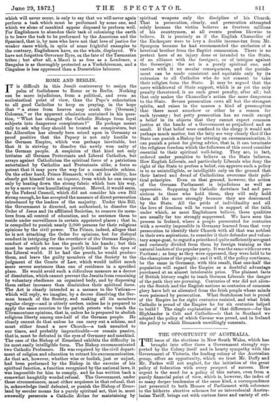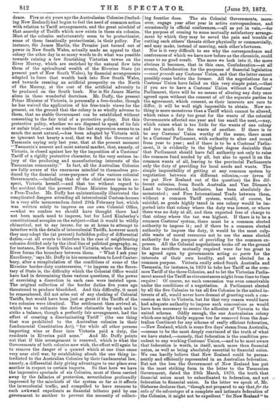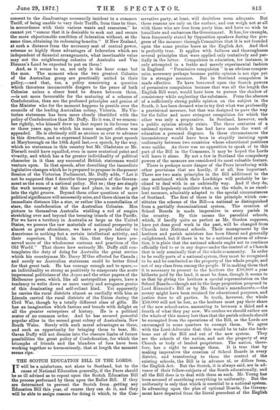THE OPPORTUNITY OF AUSTRALIA.
THE issue of the elections in New Smith Wales, which has brought into office there a Government strongly sup- ported by the Colony itself and in hearty sympathy with the Government of Victoria, the leading colony of the Australian group, offers an opportunity, which we trust Mr. Daffy and Mr. Parkes will not neglect, for the initiation of the great policy of federation with every prospect of success. How urgent is the need for a policy of this nature, even from a purely financial point of view, which is, however, the index of so many deeper tendencies of the same kind, a correspondence just presented to both Houses of Parliament with reference to the hitherto abortive schemes for an intercolonial Austra- lasian Tariff, brings out with carious force and variety of evi-
deuce. Five or six years ago the Australasian Colonies (includ- ing New Zealand) had begun to feel the need of common action with relation to Tariff arrangements, and the great mischief of that anarchy of Tariffs which now exists in these six colonies. Most of the colonies unfortunately seem to be protectionist, some of them fanatically protectionist, in their policy. For instance, Sir James Martin, the Premier just turned out of power in New South Wales, actually made an appeal to that colony the other day in so many words to do what was possible towards ruining a few flourishing Victorian towns on the River Murray, which are enriched by the natural flow into them of the agricultural wealth of the Riverine State (at present part of New South Wales), by financial arrangements adapted to force that wealth back into New South Wales, and towards creating an artificial prosperity on the North of the Murray, at the cost of the artificial adversity to be produced on the South bank. Nor is Sir James Martin alone in these wonderful doctrines. Mr. Duffy, the present Prime Minister of Victoria, is personally a free-trader, though he has waived the application of his free-trade views for the present, on the ground that the colony is so wholly adverse to them, that no stable Government can be established without consenting to the fair trial of a protective policy. But this protective policy, whether we are disposed to speak of its fair or unfair trial,—and we confess the last expression seems to us much the most natural,—has been adopted by Victoria with so ignorant but hearty a zeal, that we find the Governor of Tasmania saying only last year, that at the present moment "Tasmania's nearest and most natural market, that, namely, of Victoria, is closed against her by the imposition of a Customs' Tariff of a rigidly protective character, to the very serious in- jury of the producing and manufacturing interests of the Tasmanian community." In fact, all the Australian Colonies are fully aware of the enormous mischief to themselves pro- duced by the financial cross-purposes of the various colonial Governments,—including that of the chief sinner in this re- spect, Victoria herself,—and that too without regard to the accident that the present Prime Minister happens to be a Free-Trader. Mr. Duffy has unintentionally illustrated the complicated dangers attending all intercolonial Custom-houses in a very able memorandum dated 29th February last, which was written solely to impress on our own Colonial Office, —what we confess we should have thought there had not been much need to impress, but for Lord Kimberley's constitutional scruples on the subject—that it would be wildly chimerical, not to say insane, for us at home to attempt to interfere with the details of intercolonial Tariffs, however much they may adopt the (at present) forbidden policy of differential duties,—at all events to interfere in the case of neighbouring colonies divided only by the ideal line of political geography, as, for instance, New South Wales and Victoria, where the Murray River forms the boundary between them. "What I ask your Excellency," says Mr. Duffy in his memorandum to Lord Canter- bury, after a recapitulation of the conditions of some of the Riverine border-duty controversies, "to impress on the Secre- tary of State is, the difficulty which the Colonial Office would have had in determining these various questions, if the power of exercising a discretion in each case were insisted upon. The original collection of the border duties five years ago threatened to produce bloodshed. And this difficulty, it must be remembered, did not arise out of any clashing of Colonial Tariffs, but would have been just as great if the Tariffs of the two colonies were identical. The settlement then arrived at, which was to estimate the duties claimable by each and to strike a balance, though a perfectly fair arrangement, had the effect of creating a discriminating Tariff" (the one thing that was prohibited to the Australian colonies in their fundamental Constitution Act), "for while all other persons importing wine or flour into Victoria paid a duty, the residents in Riverina paid none." And Mr. Duffy points out that if this arrangement is renewed, which is what the Governments of both colonies now wish, the effect will again be to remove the danger of a quarrel which at one time came very near civil war, by establishing afresh the one thing in- terdicted to the Australian Colonies by their fundamental law, namely, a differential duty giving advantages to one place over another in respect to certain imports. So that here we have the impressive spectacle of six Colonies, most of them carried away by the fallacies of protection, nevertheless profoundly impressed by the mischiefs of the system so far as it affects the intercolonial traffic, and compelled to have recourse to such awkward expedients as financial tributes paid by one government to another to prevent the necessity of collect- ing frontier dues. The six Colonial Governments, more- over, engage year after year in active correspondence, and occasionally in official conferences,—all as yet in vain,—for the purpose of coming to some mutually satisfactory arrange- ment by which they may be saved the pain and trouble of cutting each others' throats either physically or commercially, and may make, instead of marring, each other's fortunes.
Nor is it very difficult to see why the correspondence and conferences of which we have now before us the chronicle, could come to no good result. The more we look into it, the more obvious it becomes, that in this case, Confederation—at all events, Confederation for the purposes of financial legislation —must precede any Customs' Union, and that the latter cannot possibly come before the former. All the negotiations for a Customs' Union have failed on this very simple point,—that if you are to have a Customs' Union without a Customs' Parliament, there will be no means of altering any duty once agreed upon without the consent of all the separate parties to the agreement, which consent, as their interests are sure to differ, it will be well nigh impossible to obtain. Now no- thing is more monstrous than a Tariff which cannot be altered, which raises a duty too great for the wants of the colonial Governments affected one year and too small the next,—nay, which raises what is too little for the wants of one colony and too much for the wants of another. If there is to be any Customs' Union worthy of the name, there must be a Customs' Parliament, with authority to alter and recast from year to year ; and if there is to be a Customs' Parlia- ment, it is evidently in the highest degree desirable that that Parliament should have full authority not only to raise the common fund needed by all, but also to spend it on the common wants of all, leaving to the provincial Parliaments only the day of providing for local needs and wants. The simple impossibility of getting at any common system by negotiation between six different colonies,—or (even if we put New Zealand out of the question) the five dif- ferent colonies, from South Australia and Van Diemen's Land to Queensland, inclusive, has been absolutely de- monstrated; and Free International Trade between them, without a common Tariff system, would, of course, be suicidal, as goods highly taxed in one colony would be im- ported into that colony where. the duty was lowest, or where there was no duty at all, and then exported free of charge to that colony where the tax was highest. If there is to be a common Customs' system, there must be a common elected authority to impose it ; and if there be a common elected authority to impose the duty, it would be the most culp- able waste of moral resources not to use the same elected authority for the purpose of providing for the common ex- penses. All the Colonial negotiations broke off on the ground that the sacrifices mutually required were far too great to be agreed upon by governments acting ex parts for the interests of their own locality, and not elected for a common purpose. Victoria coolly asked South Australia and Tasmania, for instance, in 1870 to take her Tariff as the com- mon Tariff of the three Colonies, and to let the Victorian Parlia- ment amend the Tariff as circumstances might from time to time require Of course, no such concession was even conceivable under the conditions of a negotiation. A Parliament elected by all the five Colonies to tax all five Colonies in the united in- terests of all, would never have dreamt of granting such a con- cession as this to Victoria, but for that very reason would have had adequate authority to impose such concessions as would have been necessary to secure the adhesion of Victoria to the united scheme. Oddly enough, the one Australasian colony which one might fairly suppose too far removed from the Aus- tralian Continent for any scheme of really efficient federation, —New Zealand, which is some five days' steam from Australia, —seems to be the most deeply convinced of the truth of what we have stated,—namely, that federation is the condition pre- cedent to any working Customs' Union,—and to be most aware that federation is worth, in itself, much more than financial union, as well as being absolutely essential to financial union. We can hardly believe that New Zealand could be perma- nently and efficiently represented in an Australian federation. But not the less the Government of New Zealand has put in the most striking form in the letter to the Tasmanian Government, dated the 28th March, 1870, the truth that financial union must be subordinated to federation, and not federation to financial union. In the letter we speak of, Mr. Gisborne declares that, "though not prepared to say that for the sake of the advantages of a complete and intimate federation of the Colonies, it might not be expedient" for New Zealand "to
consent to the disadvantage necessarily incident to a common I Tariff, of being unable to vary their Tariffs, from time to time in acccordance with their various wants and resources, he cannot yet "concur that it is desirable to seek out and secure the more objectionable condition of federation without, at the same time, obtaining its redeeming benefits." If New Zealand, at such a distance from the necessary seat of central power, esteems so highly those advantages of federation which are independent of financial arrangements, what inestimable value may not the neighbouring colonies of Australia and Van Dieman's Land be expected to put on them!
And, as it seems to us, not only is the hour come but the man. The moment when the two greatest Colonies of the Australian group are practically united in their policy,—and that, too, a policy concerning a question which threatens innumerable dangers to the peace of both Colonies unless a closer bond be drawn between them, —is not more favourable for the maturing of a scheme of Confederation, than are the professed principles and genius of the Minister who for the moment happens to preside over the councils of the leading Australian colony, Victoria. No Vic- torian statesman has been more closely identified with the policy of Confederation than Mr. Duffy. He it was, if we remem- ber rightly, who himself drew up that report in its favour two or three years ago, to which his name amongst others was appended. He is obviously still as anxious as ever to advance in this direction, and so expressed himself in his great speech at Maryborough on the 18th April last,—a speech, by the way, which no statesman in this country but Mr. Gladstone or Mr. Disraeli could have equalled, even in mere oratorical point and vivacity, and which has a far greater individuality of political character in it than any successful British statesman would venture upon. In that speech, after describing the immediate legislative changes which he is prepared to propose in the present Session of the Victorian Parliament, Mr. Duffy adds, "Let it not be supposed that I describe these proposals of the Govern- ment as the sum of a national policy. Not so ; they are simply the work necessary at this time and place, in order to get into the right groove. Beyond them other questions of more political significance will necessarily arise, and there shines in the immediate distance like a star, or rather like a constellation of stars, the confederation of the Australian Colonies. Men picture to themselves Australia wielding a rod of empire stretching over and beyond the teeming islands of the Pacific. For we have a territory in Australia as large as the United States, we possess the raw materials of national prosperity in almost as great abundance, we have a people inferior to Americans in nothing but a certain intellectual activity, and their superiors, I think, in this, that they have pre- served more of the wholesome customs and practices of the Old World." That shows how seriously Mr. Duffy still con- templates the duty of doing for Australia the great service which his countryman Mr. Darcy litrGee effected for Canada ; and surely no Australian statesman could be better fitted for that great task. He has courage enough and to spare,— an individuality so strong as positively to exasperate the acute impersonal politicians of the Argus and the other papers of the Melbourne press, which, like all metropolitan papers, have a tendency to write down as mere vanity and arrogance genius of this dominating and self-reliant kind. Yet apparently he carries the rural districts almost as cordially with him as Lincoln carried the rural districts of the Union during the Civil War, though by a totally different class of gifts. He has an imagination which fastens and broods with delight on all the greater enterprises of history. He is a political orator of no common order. And he has secured powerful popular allies in the second great colony of Australasia, New South Wales. Surely with such moral advantages as these, and such an opportunity for bringing them to bear, Mr. Gavan Duffy will not dismiss into the obscure limbo of future possibilities the great policy of Confederation, for which the triumphs of friends and the blunders of foes have been working together so harmoniously, that at length the moment seems ripe. '




































 Previous page
Previous page